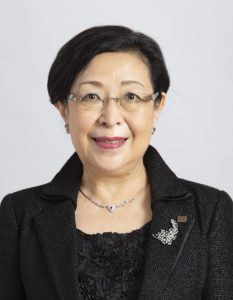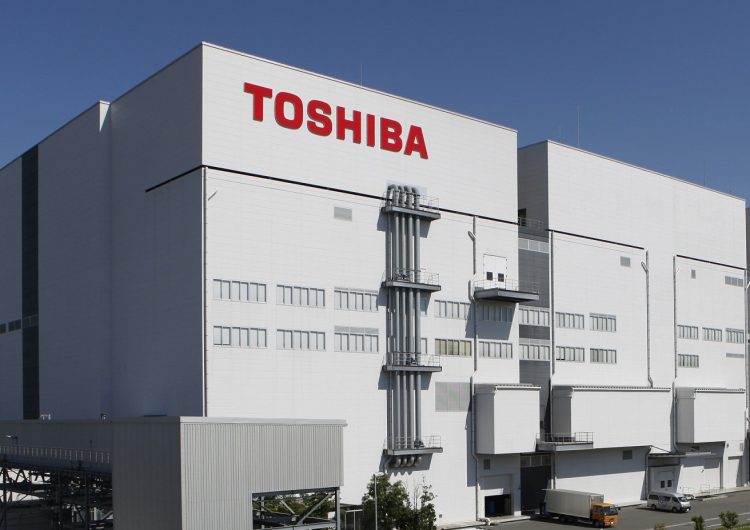
- Toshiba director Mariko Watahiki staging public campaign against Farallon, Elliott
- Company formally recommended Farallon and Elliott reps on own director slate
- Watahiki used Toshiba staff to organize press conference to voice views
- Toshiba has indicative bids from major private equity firms KKR, Blackstone, others
- Watahiki is a career judge who owns no stock while Farallon, Elliot own $2 billion
- Leading activism lawyer says firms in Toshiba’s position should use best efforts to support their nominees
- Lawyer also says minority dissenters should voice concerns on their “own dime”
By Jarrett Banks and John Jannarone
Just when it seemed Toshiba Corp. (6502.T) was on its way out of corporate governance hell and finally listening to shareholders, an outside director is pulling the company back in.
Mariko Watahiki, 67, a former Nagoya High Court chief, is opposing the election of two directors representing activist investors in an upcoming shareholder vote, launching a public campaign with company assistance to discredit them for lacking fairness and balance—and saying they would only pursue short-term profit.
Ms. Watahiki, who became an external board member last year and owns no Toshiba stock according to the company’s website, has spoken out against Eijiro Imai, a managing director at Farallon Capital Management, and Nabeel Bhanji of Elliott Management Corp. both in press interviews and a Toshiba-organized press conference. The ploy is bizarre because it comes after Toshiba itself announced a slate of 13 proposed directors last month including Messrs. Imai and Bhanji ahead of its shareholder meeting scheduled for June 28. The two activist funds collectively hold about $2 billion of Toshiba stock.
Until Ms. Watahiki’s attempt to subvert Toshiba’s own agreement with Farallon and Elliott emerged, it appeared the company was finally on a path to creating real shareholder value after years of scandal and flagrantly-poor share price performance. Toshiba has said it received eight offers to buy out the conglomerate, as well as two proposals for capital and business alliances. The company said in a filing it will evaluate the non-binding bids and choose one or more to pursue after the shareholder meeting.
The company hasn’t disclosed names, but the suitors are as serious as they come. Mainstream media reports indicate private equity investors including CVC Capital Partners, Blackstone Inc., KKR and Bain Capital were considering making bids, as well as state-backed investment fund Japan Investment Corp. Private equity fund MBK Partners also submitted a bid and may form a consortium for Toshiba.
It’s understandable why senior management at Toshiba might be backing Ms. Watahiki behind the scenes. In Japanese conglomerates, employment is usually for life and many executives still cling to the security and prestige of a big corporate name. Cross-shareholdings with insurers and other large corporations also add to their clout.
But Ms. Watahiki’s argument that activist investors don’t know enough about Toshiba’s business is curious coming from someone who was a judge for 40 years with little corporate management experience. Of note, she’s also on the governance committee at LIXIL Group Corp., which manufactures housing equipment. This only makes her use of corporate money to oppose the directors more concerning.
Neither Toshiba, Farallon nor Elliott responded to requests for comment from CorpGov. Despite organizing a press conference with Ms. Watahiki, the company said this week that Ms. Watahiki’s opinions are her personal views and don’t represent the company’s position. Ms. Watahiki, who couldn’t be reached for comment, recently told Bloomberg, “If we take people from just one specific group, it’s impossible to avoid conflicts of interest.”
CorpGov has extensively reported on Toshiba’s previous struggles with governance and securities lawyers say several elements about the current situation raise fresh concerns. First, the company inserted a footnote in the so-called convocation notice announcing the annual meeting to indicate that Ms. Watahiki opposed the nomination of Messrs. Imai and Bhanji even though the company had reached a deal to place them on the board including standard nomination agreements.
“It is very unusual to see objections of a vocal minority of a board to the candidates recommended by the majority of the directors, particularly after a company has entered into a nomination agreement supporting the election of these candidates,” said Lawrence Elbaum, Partner at Vinson & Elkins LLP in New York and co-head of his firm’s Shareholder Activism practice.

Ms. Mariko Watahiki
He said that the nomination agreements for Farallon and Elliot looked to be well within the market for shareholders who strike friendly deals for board seats. “I have read hundreds of nomination agreements, and the Toshiba agreements include many of the typical terms a company and nominating shareholders would expect to see surrounding the board’s efforts to elect shareholder-approved directors and the concessions from activist shareholders in return.”
It is also concerning that Ms. Watahiki’s press conference was hosted by Toshiba itself. “Usually, when less than a majority of a board disagrees with the directors endorsed by the majority, should the minority wish to voice their dissent, they will do it on their own dime through their own PR channels,” Mr. Elbaum said. “If a company reaches a deal to support certain directors, and is required to use best efforts to get them elected, then any activist may claim with force that best efforts are not met where company permits a dissenting director to air dirty laundry about directors subject to a nomination agreement. The activist may argue the company needs to go much further to provide that best efforts are being used to get the new director nominees elected.”
Toshiba’s leaders have long fought against the idea of privatization, with former Chief Executive Officer Satoshi Tsunakawa laying out five reasons why it would be the wrong decision earlier this year. Taro Shimada, the new chief executive, recently told The Wall Street Journal that he wanted any buyer to keep the company in one piece to promote innovation. Mr. Shimada pointed out that Toshiba’s business model has worked in the past, yielding such fruits as the first laptop computer in the 1980s.
Like early laptops, business models that thrived in the 80s have evolved with the times. If Ms. Watahiki and the old guard she represents continue to resist change, stakeholders in Toshiba and Japan Inc. will risk being left behind.
Contact:
CorpGov
www.CorpGov.com
Jarrett Banks
Editor-at-Large
jb@capmarketsmedia.com







